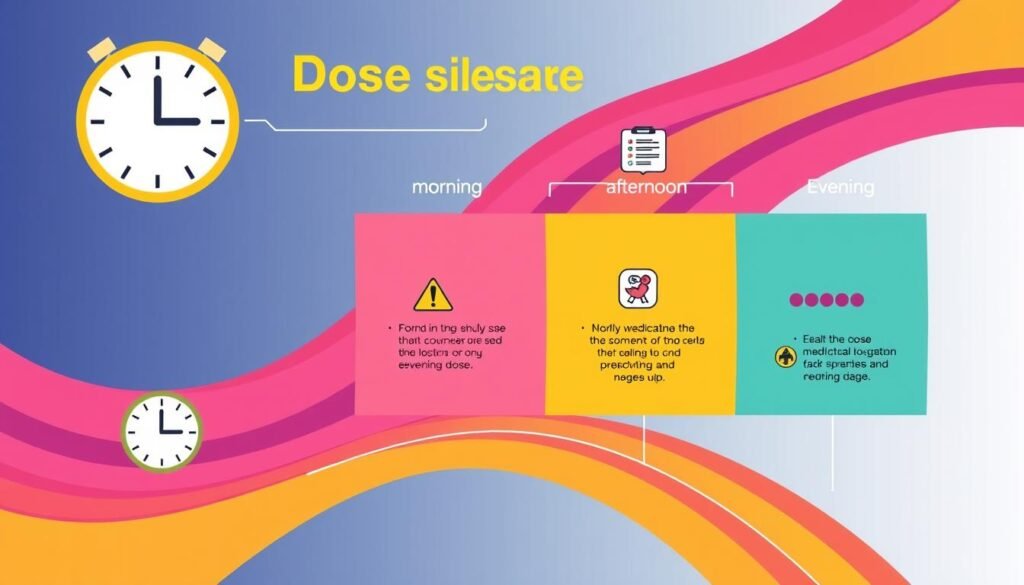About 50% of medication errors happen during prescription, order, and giving stages. This fact stresses the importance of knowing when to take meds and its side effects. Many people use meds to control health issues. So, it’s vital to understand how the timing of doses affects drug effectiveness and side effect risks. This article looks into side effects based on dosing time. It gives insights into drug movement in the body and how different ways of taking a drug affect results.
The body goes through several steps to process meds, starting with absorption. How a drug is taken can greatly change how well and fast it works. For example, oral meds often lose power due to first-pass effect, as digestive enzymes break them down. This reduces their effectiveness. However, drugs applied through the skin go straight into the blood. This avoids the liver and gives more steady symptom relief.
Understanding how timing affects side effects is key. Picking the right time to take meds is not just about better results. It also lowers the chances of unwanted reactions.
Key Takeaways
- Knowing about drug movement (pharmacokinetics) is key for the best drug use.
- Common ways to take meds include by mouth, through the skin, and by IV, each with different absorption rates.
- The timing of doses plays a big role in side effect risks.
- Many medication mistakes come from bad communication and stressed healthcare teams.
- Choosing the right timing boosts med effectiveness and safety.
Understanding Pharmacokinetics and Pharmacodynamics
Pharmacokinetics and pharmacodynamics are crucial in using drugs safely and effectively. Pharmacokinetics deals with how the body absorbs, distributes, metabolizes, and excretes drugs. This is often summed up by the acronym ADME. The ways drugs are absorbed and metabolized are key to how well they work in the body.
Key Concepts of Drug Absorption and Distribution
Drug absorption is how a medication gets into the bloodstream. The term bioavailability refers to the amount of drug that actually reaches circulation, affecting the drug’s effectiveness. How you take a drug affects its absorption; for example, drugs given through veins often work better than those taken by mouth.
Drug distribution depends on the circulation and the drug’s physical and chemical features. This is an important part of understanding pharmacokinetics.
The Impact of Timing on Drug Metabolism
The timing of taking drugs is key to how they work, involving pharmacodynamics. Things like daily body cycles influence drug absorption, distribution, metabolism, and excretion. Disruptions, such as jet lag, can change how a drug is metabolized.
A drug’s half-life tells us how often to take it to keep its effect steady. Drugs with a short half-life need taking more often. This knowledge is crucial for the best drug use and for reducing side effects. It shows the deep link between pharmacokinetics and pharmacodynamics in treatment.
| Concept | Description |
|---|---|
| Bioavailability | Fraction of the administered dose reaching systemic circulation. |
| Clearance | Rate at which a drug is eliminated from the body. |
| Half-Life | Time taken for the plasma concentration of a drug to reduce by half. |
| Therapeutic Index | Difference between the dose necessary for therapeutic effects and the dose causing harmful effects. |
| Chronotherapy | Timing treatment based on biological rhythms to enhance efficacy. |
For deeper insights into these essential concepts, consider exploring more on the interaction of pharmacokinetics and pharmacodynamics.
Common Side Effects Based on Timing of Dosing
Knowing when to take your medicine is key to understanding common side effects. Different meds can have different side effects depending on when they’re taken. For example, taking some meds in the morning vs. the evening can impact how your body reacts because of your natural body clock.
Types of Side Effects Influenced by Timing
Side effects from meds can change based on when you take them. Here are some examples:
- Central Nervous System Effects: Evening meds might make you sleepy. Morning doses can make you more alert.
- Gastrointestinal Effects: The timing of meds can cause nausea or vomiting to get worse.
- Cardiovascular Effects: Some blood pressure medicines work better when taken at certain times. This can help avoid side effects like dizziness or tiredness.
Specific Medications and Their Timing-Related Side Effects
Some meds have side effects that greatly depend on when they’re taken. Here are some examples:
| Medication | Recommended Timing | Common Side Effects |
|---|---|---|
| Antihypertensives | Evening | Dizziness, hypotension, fatigue |
| Statins | Evening | Muscle aches, nausea |
| Allergy Medications | Morning | Drowsiness, dry mouth |
| Diuretics | Morning | Increased urination, electrolyte imbalance |
Knowing the best time to take your meds can help you handle side effects better. This is especially true for people with many chronic illnesses who deal with lots of medication side effects. By choosing the right time to take your meds, you can stick to your treatment better and avoid bad reactions, leading to better health.
Optimal Dosing Time for Medication Effectiveness
Choosing the best time to take medications can make a big difference. It can make them work better and lessen side effects. Whether you take them in the morning or evening matters a lot. The time that works best can depend on the person taking the medication.
Morning vs. Evening Dosing Advantages
For some conditions, taking medicine in the morning is better. Diuretics are taken this way to avoid waking up at night. Blood pressure medicines often work the same whether taken in the morning or evening. This was shown in a study called the TIME trial.
Evening dosing is advised for some drugs like statins, because our body makes more cholesterol at night. Certain beta blockers might be taken at bedtime to reduce side effects like dizziness. This helps the medicine work better with fewer risks for the patient.
Patient Considerations for Timing of Dosing
Deciding when to take medicine isn’t the same for everyone. Things like age, body size, and how well your kidneys and liver work matter. Older people and children are often more sensitive to medicines. So, doctors need to be careful with their doses.
For those with diabetes, timing is key to manage blood sugar. Drugs like metformin work best with food. Some meds need to be taken with food to work right. Considering each person’s unique needs helps make treatments more effective and safer.
Drug Side Effects Timing Explained
Taking medicine at the right time can boost its effects and lessen side effects. Matching medications with circadian rhythms often improves results. These rhythms control our physical and mental changes over a day, affecting health. Studies show that meds timed with these cycles work better and have fewer side effects.
Influence of Circadian Rhythms on Drug Effectiveness
Research shows some meds work best at certain times. For example, blood pressure meds might do better if taken when blood pressure changes during the day. The success of a medication can depend on the drug, as well as the person’s age, sex, and health.
Clinical Studies on Timing and Medication Side Effects
Clinical studies highlight timing’s role in side effect management. People with stomach issues often do better by timing medicine with meals. Drugs like Benadryl, which can make you sleepy, are best taken at specific times. This helps drugs work better and lessens bad effects.

Talking with doctors about side effects is crucial. Watching for new symptoms and discussing them helps tailor treatment. For more advice on handling side effects, visit detailed resources.
Medication Timing Side Effects: An Overview
It’s important to know how medication timing affects side effects to improve treatment. Medications react differently based on several things. These include how the body processes them, individual health, and possible reactions with other drugs. Age, health status, and lifestyle choices like diet and substance use also play a role.
Factors Influencing Timing-Related Side Effects
Many factors can change how and when side effects show up. These include:
- Patient Health: People with existing health problems, especially heart issues, may have a higher risk of severe side effects.
- Medication Interactions: Taking several medications can cause unexpected side effects or increase those related to timing.
- Aging: Older people often face more side effects, needing close monitoring and sometimes different doses.
- Lifestyle Choices: Smoking, drinking, and what you eat can affect how well medications work and their side effects.
Medication Timing and Patient Experiences
Looking at patient stories shows how personal experiences with medication timing can vary. Some patients don’t follow their medication schedules well. They might not feel sick or understand their treatment plans. Poor communication between medical staff and patients plays a big part in this problem—up to 55% of the time. Additionally, not having enough money can stop patients from taking their medications as needed. Research shows that investing in helping patients stick to their plans can save a lot of money on healthcare costs.
| Timing-Related Factors | Impact on Patient Experience |
|---|---|
| Age (over 60) | Risk of stomach bleeding and serious side effects goes up. |
| Pre-existing Conditions | More chance of heart or liver issues. |
| Medication Interactions | Could make timing-related side effects worse. |
| Financial Factors | Money problems can make it hard to follow medication plans. |
| Lack of Symptoms | Not feeling sick might lead to skipping medications. |
Patient input highlights the importance of customizing medication schedules to lessen timing side effects. Knowing the risks can help patients do better with their medications, leading to better health.
Timing of Day Dosing Side Effects
Knowing when to take your medicine is key to handling side effects well. Whether you take it in the morning or evening matters a lot. This is because different drugs can affect you differently based on the timing.
Morning Dosing and Associated Effects
Morning doses, especially of stimulants, can make you feel more alert. They might cause anxiety or restlessness in some people. Yet, they often boost focus and energy during the day. But, some might face issues like:
- Anxiety spikes
- Increased heart rate
- Restlessness
- Gastrointestinal discomfort
Making small changes in morning habits can ease these symptoms. Trying relaxation techniques before medication can help. To learn more about reducing anxiety, check out Mood Care Health.
Evening Dosing – Side Effects to Consider
Taking medicine at night has unique problems. You might feel very sleepy, have trouble sleeping, or feel sick to your stomach. Nighttime doses can lead to:
- Sedation
- Nighttime awakenings
- Stomach upset
- Possible interference with nightly routines
To lessen these effects, try to keep a regular bedtime. Being informed about how meds work at different times can help you manage side effects better.
Chronotherapy Adverse Reactions
Chronotherapy is a cutting-edge method that matches medication times with our body’s clock. It aims to boost the good effects of drugs while lowering bad side effects. Studies show it works well, especially for asthma and cancer, since these conditions change throughout the day.
Understanding Chronotherapy and Its Benefits
Research tells us that 56% of studies see drug effects change depending on when you take them. Thus, chronotherapy makes medicines work better by choosing the right time to take them. For asthma, taking meds at certain times can help with night symptoms, showing timing’s big role.
Clinical trials show it helps a lot with different health issues. This proves it’s a game-changer in treatment methods.
Potential Risks Associated with Chronotherapy
But, chronotherapy benefits come with some chronotherapy risks. Patients might react more to medicines at certain times, leading to stronger side effects or issues if they miss a dose. Since everyone’s body clock is different, the therapy must be customized for it to work well.
Dosing Schedule Side Effects
Patients sometimes miss doses or take too much of their medication. Dosing schedule side effects can happen, impacting treatment. Knowing about these effects is vital for everyone involved.
Common Problems with Irregular Dosing
Not sticking to a dosing schedule can cause issues like:
- Lowered medication effectiveness.
- More side effects from changing drug levels.
- Worsening of health conditions.
- Confusion and anxiety about managing medications.
Research shows that about 11% of prescriptions have mistakes. And 16% of these mistakes can harm patients. How your body processes drugs can depend on factors like age or kidney function.
Strategies to Minimize Side Effects from Dosing Schedules
There are ways to keep up with your dosing schedule and lower side effects:
- Set reminders: Use your smartphone to remember medication times.
- Medication tracking apps: These apps help you keep track of your doses.
- Consult healthcare providers: Talk often about your medication plan to spot issues early.
- Use pill organizers: These sort your weekly doses, cutting down on mistakes.

It’s key to understand how to dose correctly. It helps patients see the importance of sticking to their schedule. This lowers the risks that come with irregular dosing problems.
| Issue | Impact | Recommended Strategy |
|---|---|---|
| Missed doses | Reduced therapeutic effect | Set reminders |
| Double dosing | Increased side effects | Pill organizer |
| Inconsistent schedule | Worsened medical conditions | Regular provider consultations |
| Anxiety from confusion | Patient distress | Medication tracking apps |
Timed Release Medications Side Effects
Timed-release medications slowly release their active parts over time. This method keeps the dosage steady, helping patients stick to their medication plan. It also reduces drug level swings. Knowing how these drugs work helps us understand their benefits and possible side effects.
How Timed-Release Formulations Work
These drugs are made to dissolve slowly. This slow release keeps the drug’s level stable. For example, metoprolol, venlafaxine, and theophylline use this technology. It makes taking medication easier, especially for those needing steady drug levels. By smoothing out the highs and lows in drug levels, it reduces side effects and seizure risks.
Side Effects Specific to Timed-Release Medications
Timed-release drugs can have side effects ranging from mild to severe. Common side effects include:
- Dizziness and drowsiness, which may affect daily activities.
- Liver problems, seen as stomach pain and dark pee.
- Pancreatitis, with sudden belly pain, feeling sick, and throwing up.
- Hyperammonemic encephalopathy, shown as weakness and changing mental state.
- Allergic reactions that can harm organs like the liver or kidneys.
- More chances of odd behaviors and getting irritated easily.
- Possible withdrawal symptoms if the drug is stopped suddenly.
It’s key for patients to talk to their doctors about all medicines they use. This talk helps prevent bad reactions. Pregnant women should especially discuss the use of these drugs with their doctor. Timed-release medications might harm the baby’s growth.
| Side Effect | Symptoms | Recommended Action |
|---|---|---|
| Dizziness and Drowsiness | Impairment of alertness and coordination | Avoid driving; consult a physician if persistent |
| Liver Issues | Abdominal pain, dark urine, fever | Seek immediate medical attention |
| Pancreatitis | Sudden stomach pain, nausea | Contact healthcare provider immediately |
| Hyperammonemic Encephalopathy | Drowsiness, weakness, changes in mental status | Urgent medical evaluation needed |
| Allergic Reactions | Fever, rash, abdominal pain | Emergency medical help required |
Understanding how timed release drugs work and their side effects is important. Being educated about these medications helps patients use them safely. This knowledge can lower risks and improve treatment success.
Drug Administration Timing Side Effects
Knowing when to take your medicine is key for the best results. Different medicines need to be taken at certain times to work right and avoid bad reactions. This part talks about common medicines and the need to take them at the right time to prevent improper timing side effects.
Commonly Used Drugs and Their Administration Timing
There are several ways to take medicine, each with its own features:
- Oral Administration: This is the easiest way. Most medicines go into your blood through the small intestine.
- Sublingual Administration: This method gets medicine into your blood fast. It’s used for drugs like nitroglycerin, avoiding certain breakdowns.
- Rectal Administration: Good for those who can’t swallow. About half gets into your blood.
- Intravenous Injection: Works quickly and is crucial in emergencies.
- Intramuscular Injections: Absorption speed varies by injection site. The ventrogluteal muscle is often suggested.
- Subcutaneous Injections: Releases medicine slowly, good for long-term treatments like insulin.
Taking medicines the right way at the right time helps avoid improper timing side effects. Those can include not enough medicine in your body or too much, which can be harmful.
Side Effects from Improper Drug Administration Timing
Not taking medicine on time can cause serious issues. For example:
- Oral medications not taken on time may not ease symptoms, leading to discomfort.
- If sublingual medicines are taken too late, they won’t be absorbed quickly.
- Intravenous drugs given too late may not work well in urgent situations.
Healthcare workers emphasize sticking to the schedule for medicines. This helps patients get the best results. For more on medicines like clonazepam and their side effects, check this article.

Conclusion
The time you take your meds greatly affects how you handle side effects. Knowing that drug effects vary with timing is key to better treatment. For example, about 67% to 90% of people on lithium face side effects. This shows why we must think about when to take medicine.
Research also tells us that studies not published often share more about side effects. Unpublished studies report them 95% of the time, while published ones only 46%. This gap highlights the need for careful monitoring and honest reporting in treatments.
It’s important for doctors to teach patients about the effects of taking meds at different times. Understanding this can help patients use their meds more effectively and avoid side effects. Taking steps early on improves health outcomes and helps people stick with their treatment plans.